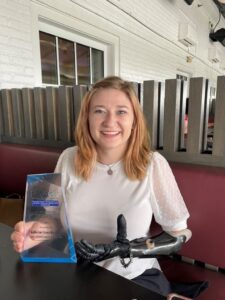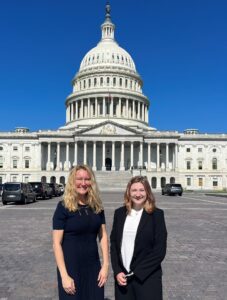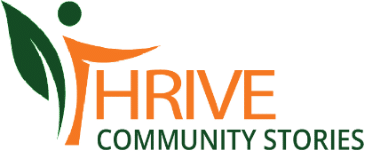By Jewel Connelly, Communications Specialist
 Kate Ketelhohn had no intention of becoming a disability rights lawyer when she accepted the 2023 George and Dena Breece Fellowship, and after a summer in Washington D.C. she still isn’t a policy expert. However, she is a much stronger and more informed self-advocate, taking away many new skills, connections, and a greater understanding from the experience. On track to attend medical school and become a doctor, the current junior at Johns Hopkins University approached the opportunity hoping to be equipped with tools to advocate for her future patients (and herself). Having been part of the amputee community since infancy, Kate believed she had a thorough grasp on the inner workings of insurance, that is until the fellowship opened her eyes.
Kate Ketelhohn had no intention of becoming a disability rights lawyer when she accepted the 2023 George and Dena Breece Fellowship, and after a summer in Washington D.C. she still isn’t a policy expert. However, she is a much stronger and more informed self-advocate, taking away many new skills, connections, and a greater understanding from the experience. On track to attend medical school and become a doctor, the current junior at Johns Hopkins University approached the opportunity hoping to be equipped with tools to advocate for her future patients (and herself). Having been part of the amputee community since infancy, Kate believed she had a thorough grasp on the inner workings of insurance, that is until the fellowship opened her eyes.
At the persistent urging of her friend (and 2022 Breece Fellow) Nikki Grace-Strader, Kate decided to put her name in for consideration and was selected for what would prove to be an unforgettable summer. From writing a Veterans Affairs (VA) memo, to helping organize the National Association for the Advancement of Orthotics & Prosthetics’ (NAAOP) Virtual Congressional Fly-In, and visiting clinical members in Florida and Iowa, each experience gave Kate insight to how the healthcare system works (or doesn’t for some) behind the scenes.
While researching changes to the VA Handbook Kate learned information she never knew as a lifelong prosthetics/orthotics user. “I didn’t realize the VA technically categorized medical alert bracelets as an orthotic,” Kate said. “It’s important to know there’s flexibility in these definitions.” With policy and healthcare being so interconnected, it is important for anyone, but especially those treating patients, to understand how the current laws dictate what is and isn’t covered by insurance. “Being able to understand the laws, how to work within them, and how to best benefit the patients with the laws that are in place I feel will help me be a better doctor for people like me with complex health conditions,” she added.
 For Kate, understanding the specifics of insurance coverage is not only essential for professional development but something she navigates in her everyday life. At just eight months old, Kate faced a serious infection which resulted in the amputation of her left hand and both partial feet. Hospital visits have always been a part of her life with the frequent adjustments being made to her prosthetics and orthotics growing up. Fast forward to the fellowship when Kate attended the Medicare/Medicaid hearing for osseointegration, she didn’t expect to learn how many applications are reviewed by those who don’t have a full grasp on how important these technologies are to users. “These laws and policies are being made by people who don’t always fully understand what we need,” Kate emphasized. “Our job as patients is to bring up these issues because if we don’t bring it up, or the people/advocates who care about us don’t, it’s not going to be on their radar.” Sharing personal stories is vital to bridging the gap between information and understanding, which is important when considering no amputation or circumstance is the same.
For Kate, understanding the specifics of insurance coverage is not only essential for professional development but something she navigates in her everyday life. At just eight months old, Kate faced a serious infection which resulted in the amputation of her left hand and both partial feet. Hospital visits have always been a part of her life with the frequent adjustments being made to her prosthetics and orthotics growing up. Fast forward to the fellowship when Kate attended the Medicare/Medicaid hearing for osseointegration, she didn’t expect to learn how many applications are reviewed by those who don’t have a full grasp on how important these technologies are to users. “These laws and policies are being made by people who don’t always fully understand what we need,” Kate emphasized. “Our job as patients is to bring up these issues because if we don’t bring it up, or the people/advocates who care about us don’t, it’s not going to be on their radar.” Sharing personal stories is vital to bridging the gap between information and understanding, which is important when considering no amputation or circumstance is the same.
As Kate dived deeper into her tasks, it became clear just how nitty gritty the insurance approval process truly is without regard for unique situations which don’t fit into neat categories. “If you are a 10th of a centimeter or a millimeter off, you’re not going to get approved – I didn’t realize insurance approvals were so black and white,” Kate said. Kate personally deals with this hard line as a user of prosthetic orthotic combos which are necessary for her to walk. Because of their categorization as ‘orthotics’ and not ‘prosthetics’, she may be denied a needed replacement covered by insurance based on a technicality. While she doesn’t always fully understand the intricacies and nuances of bills and policies, Kate is informed by her life experiences and what will benefit patients like her who are not always heard.
Her experience has even translated into how she conducts herself as President of Advocates for Disability Awareness, a club at her university. This student-run club is dedicated to raising awareness about both visible and invisible disabilities while building community for students. Much to her surprise, Kate has encountered many accessibility challenges on campus which the university is currently making progress to improve. Kate talks about how these struggles have made her more vocal as a self-advocate and the fellowship has helped her have more tact. Ultimately, whether learning to advocate for yourself or your community, anyone at any stage in life can benefit from developing a strong advocacy skillset.
Applications for the 2024 summer NAAOP Fellowship will be accepted until this Monday, February 19, by 12:00 midnight ET. If you are interested, apply today!

